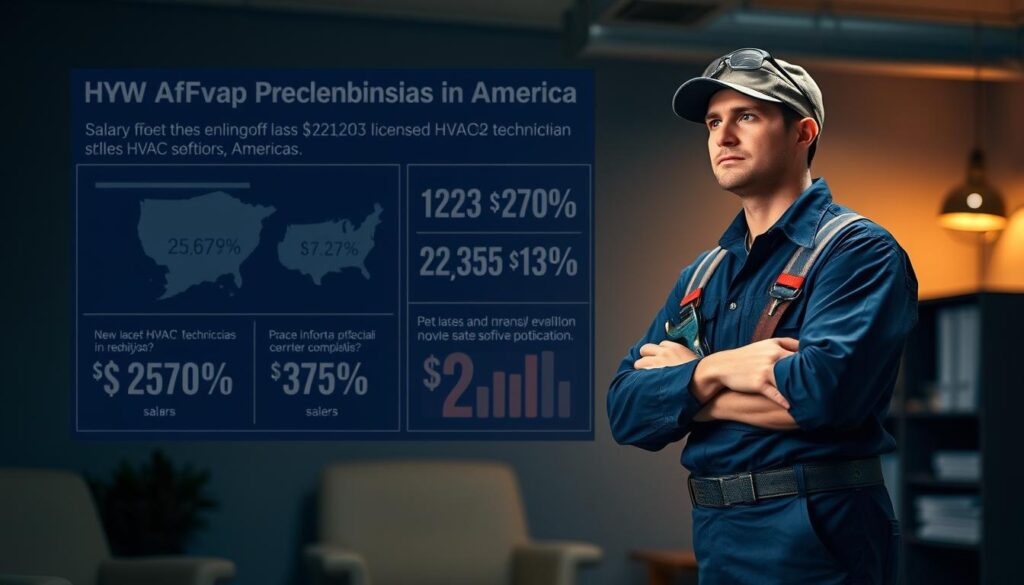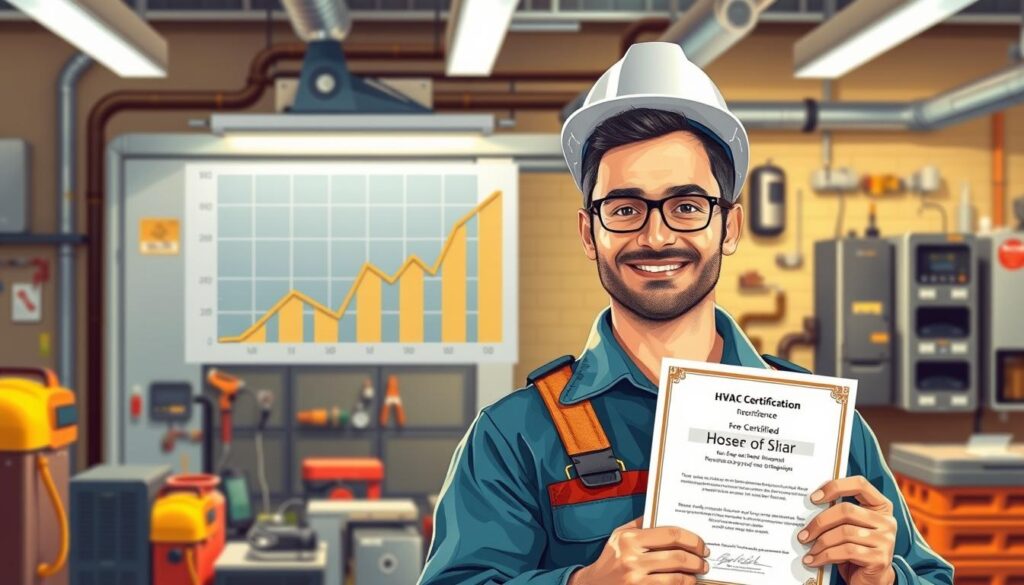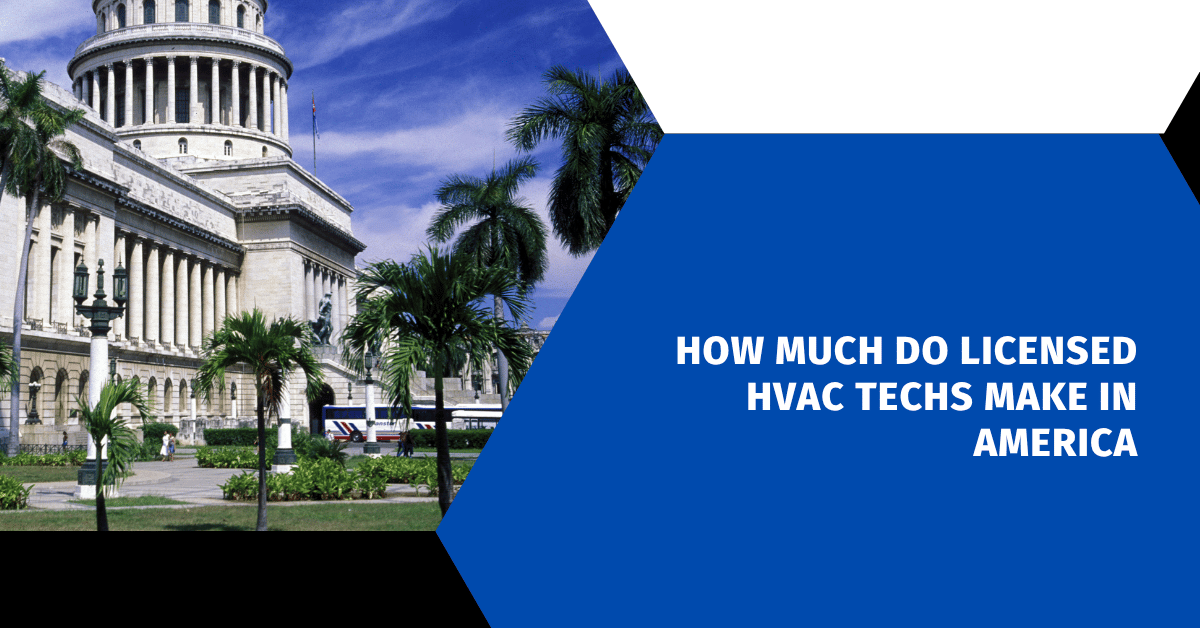Affiliate Disclosure
HVAC Guide Guys is a participant in the Amazon Services LLC Associates Program, an affiliate advertising program designed to provide a means for sites to earn advertising fees by advertising and linking to Amazon.
How Much Do Licensed HVAC Techs Make in America? Ever wondered how much HVAC techs make? The HVAC industry offers more than you might think. Skilled technicians can earn a good income each year.

The HVAC technician salary is quite promising. In 2024, the average annual income is about $49,500. But, it can go from $21,500 to $96,000 based on several factors.
To figure out what licensed HVAC techs earn, we need to look at more than just their base pay. Your income can change based on where you work, how long you’ve been doing it, your specialty, and any extra certifications you have.
Key Takeaways
- Average HVAC technician salary is approximately $49,500 annually
- Earnings can range from $21,500 to $96,000
- Geographic location significantly impacts income
- Specialized certifications can boost earning
- Experience is key to salary growth
Table of Contents
Understanding HVAC Technician Salaries in 2024
The HVAC industry is growing, with good pay and chances for advancement. Knowing how much HVAC techs make is key to choosing the right career.
National Average Salary Overview
HVAC contractors can earn a lot, with average salaries ranging from $46,000 to $68,000 a year. Hourly rates are between $22 and $35.
- Entry-level technicians start around $35,000 per year
- Experienced professionals can earn up to $75,000 annually
- Specialized technicians may command even higher salaries
Key Factors Affecting HVAC Income
Your salary can change based on a few important things:
| Factor | Potential Income Impact |
|---|---|
| Certification Level | +10-20% in earnings |
| Geographic Location | +15-30% variation |
| Specialization | +25-40% premium |
Base Pay vs Total Compensation
Your total pay is more than just your salary. Smart HVAC professionals understand the value of benefits. Employers often offer extra perks that boost your earnings:
- Health insurance
- Retirement plans
- Overtime opportunities
- Performance bonuses
By improving your skills and knowing the market, you can reach your full earning capacity in HVAC. This can lead to a rewarding career.
Explore Our HVAC Shop
Looking for top-rated HVAC tools, parts, and accessories? Visit our shop and find the perfect solution for your needs.
Visit the ShopTop Paying States for HVAC Technicians
Your salary as an HVAC technician can change a lot based on where you work in the United States. Some states pay HVAC technicians much more, making where you work very important for your earnings.
The top-paying states for HVAC pros offer great chances for making more money. Let’s look at the places where your skills can get you the highest pay:
- Alaska: Leads the pack with highest average hvac career earnings
- Massachusetts: Offers competitive salaries due to complex climate demands
- New Jersey: Strong market with premium compensation packages
- California: High cost of living translates to better pay rates
- District of Columbia: Technical expertise commands top dollar
What makes these places pay so well includes:
- Extreme weather needing advanced HVAC systems
- Higher cost of living
- Strong local economic infrastructure
- Advanced technological markets
- Stringent licensing and certification requirements
Choosing where to work can really increase your hvac professional pay. Do your research, understand local needs, and find where your skills are most needed.
Pro Tip: While high-paying states offer attractive salaries, consider cost of living and job market saturation when planning your HVAC career.
Explore Our HVAC Shop
Looking for top-rated HVAC tools, parts, and accessories? Visit our shop and find the perfect solution for your needs.
Visit the ShopExperience Levels and Corresponding Pay Scales
Your HVAC career journey is linked to your experience and skills. Knowing how hvac trade income changes with experience helps plan your growth.
HVAC job salaries change with your experience level. Here’s what you can earn at different stages:
Entry-Level Positions
Starting in HVAC, your first earnings show your basic skills and training. Entry-level technicians usually make:
- Annual salary range: $42,000 – $55,000
- Hourly rates: $20 – $25
- Minimal experience required: 0-2 years
Mid-Career Earnings
With more experience and skills, your income grows. Mid-career technicians with 3-5 years of experience can earn:
- Annual salary range: $55,000 – $72,000
- Hourly rates: $26 – $35
- Enhanced technical competencies
Senior Level Compensation
Experienced HVAC pros earn more. Senior technicians with 6-10 years of experience can make:
- Annual salary range: $70,000 – $90,000
- Hourly rates: $35 – $45
- Advanced certifications and specialized skills
Pro tip: Continuous learning and getting more certifications can boost your salary in HVAC.
How Much Do Licensed HVAC Techs Make in Different Regions
Licensed HVAC techs earn different amounts in various parts of the United States. Your salary can change a lot based on where you work. Some places pay much more than others for HVAC services.
Many factors affect how much HVAC techs make in different areas. These include the local economy, climate needs, and how many people live there. Techs in big cities usually make more than those in small towns. This is because living costs are higher and there’s more demand for services in cities.
| Region | Average Annual Salary | Hourly Rate Range |
|---|---|---|
| Northeast | $65,000 – $78,000 | $32 – $45 |
| West Coast | $62,000 – $75,000 | $30 – $42 |
| Midwest | $52,000 – $65,000 | $25 – $35 |
| Southern States | $48,000 – $60,000 | $23 – $32 |
Here are some important points for those interested in HVAC careers:
- Northeastern states pay the most to HVAC techs
- Places with extreme weather can have higher demand and pay
- Big cities offer better pay than small towns
Remember, where you work greatly affects how much you can earn. Look into local markets and understand the economy. Be open to moving for better job opportunities.
Explore Our HVAC Shop
Looking for top-rated HVAC tools, parts, and accessories? Visit our shop and find the perfect solution for your needs.
Visit the ShopCommercial vs Residential HVAC Salary Differences
When looking at hvac technician salaries, it’s key to know the differences between commercial and residential HVAC jobs. Each sector has its own pay rates and challenges. These factors can greatly affect your career path.
Commercial Sector Earnings
Commercial HVAC techs usually earn more because they work with complex systems. They handle big equipment in places like offices, hospitals, and factories.
- Average annual earnings range from $55,000 to $75,000
- More complex systems require advanced technical skills
- Potential for overtime and specialized project work
Residential Market Pay Rates
Residential HVAC techs work on home heating and cooling systems. They might earn less than commercial techs but have more regular hours and flexible schedules.
| Experience Level | Average Annual Salary |
|---|---|
| Entry-Level | $40,000 – $50,000 |
| Experienced | $50,000 – $65,000 |
Specialized Installation Income
Technicians with skills in certain installations can earn more. Specialized skills in advanced HVAC systems or green technology can mean higher pay.
Understanding these salary differences can help you plan your HVAC career. Investing in your skills is also important.
Impact of Certifications on HVAC Salaries

Getting ahead in the HVAC field is more than just basic training. Professional certifications can really boost your earnings and career. Smart technicians know that choosing the right certifications can open up big financial doors.
The top certifications in HVAC can up your earning power by 10-25%. Employers look for certified pros who show they know their stuff and are dedicated to their work.
- NATE (North American Technician Excellence) Certification
- EPA 608 Certification
- Manufacturer-specific Training Credentials
- Energy Efficiency Specialized Certifications
Getting certified can change your career path. Each certification shows you’re not just knowledgeable, but also ready for a pay raise.
| Certification | Average Salary Increase | Cost |
|---|---|---|
| NATE Core Certification | 12-15% | $150-$300 |
| EPA 608 Universal | 8-10% | $100-$200 |
| Advanced Manufacturer Cert | 15-20% | $250-$500 |
Your drive to keep learning links straight to higher earnings. Picking the right certifications can make you a leading figure in the HVAC world.
Career Growth and Income Progression
Your HVAC career offers exciting opportunities for financial growth and professional development. As you gain experience and expertise, multiple pathways can significantly boost your hvac career earnings and expand your income. This can lead to a better financial future.
Skilled HVAC technicians can turn their initial technical roles into lucrative career paths. Understanding these progression routes can help you maximize your hvac tech income. It also sets you up for long-term professional success.
Management Track Earnings
Advancing into management positions can dramatically increase your income. Typical career progression includes:
- Team Lead Supervisor
- Operations Manager
- Regional Technical Director
Managers in HVAC typically earn between $70,000 and $120,000 annually. This depends on company size and regional market conditions.
Business Ownership
Starting your own HVAC business is the ultimate income growth strategy. Successful independent contractors can earn $150,000 to $250,000 yearly. This is achieved by:
- Building a reliable client base
- Developing specialized service offerings
- Investing in marketing and reputation
Specialized Skills Premium
Technicians who invest in advanced certifications and niche expertise can command higher rates. Specialized skills in areas like industrial refrigeration, solar HVAC systems, or energy-efficient technologies can increase earnings by 20-40%.
Your commitment to continuous learning and professional development is key. It unlocks substantial income growth in the HVAC industry.
Explore Our HVAC Shop
Looking for top-rated HVAC tools, parts, and accessories? Visit our shop and find the perfect solution for your needs.
Visit the ShopMarket Demand and Future Salary Projections

The HVAC industry is changing fast, with great opportunities for those looking for stable, well-paying jobs. The U.S. Bureau of Labor Statistics says there will be a 5% annual growth in demand for skilled technicians.
Your future in HVAC looks bright. The industry expects to create over 37,000 new jobs by 2024. This growth is due to several factors:
- More focus on energy-efficient systems
- Increased residential and commercial construction
- Advancements in climate control technology
- Tighter environmental rules
New trends are changing the HVAC job market. Smart home tech and green energy solutions are creating new roles for skilled technicians. This means salaries could go up for those who keep learning and improving their skills.
New tech like IoT-enabled climate systems and sustainable cooling technologies will likely lead to higher salaries. Those who keep up with these changes will see better pay and more job options.
“The future of HVAC is not just about maintaining temperature, but delivering intelligent, energy-efficient solutions.” – HVAC Industry Expert
Planning your career and developing your skills are key to success in this field. Being ready to adapt to new tech and understand market changes will boost your income and career growth.
Conclusion
The HVAC industry is a great place for those looking for a stable and well-paying job. You’ll find that licensed HVAC techs can make between $21,500 and $96,000 a year. Your earnings can go up by learning new skills, getting certifications, and becoming an expert in your field.
Where you work, how long you’ve been doing it, and what services you offer all affect how much you can make. By always learning and knowing the latest HVAC service rates, you can earn more. Getting good at commercial systems, using the latest tech, and aiming for management roles can also help you move up.
To do well in HVAC, you need to keep improving your skills and be ready to adapt. The industry values those who keep up with new tech, get the right certifications, and are very skilled. With hard work and smart planning, you can make your HVAC job both rewarding and fulfilling.
How much you earn depends on how much you invest in your career. The HVAC field has many opportunities for those who are willing to learn and use new technologies.

